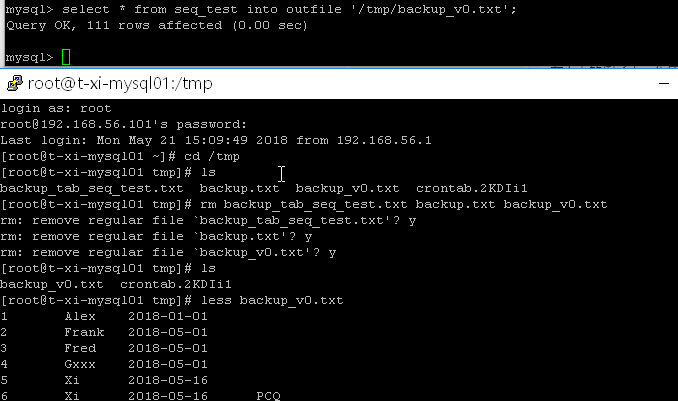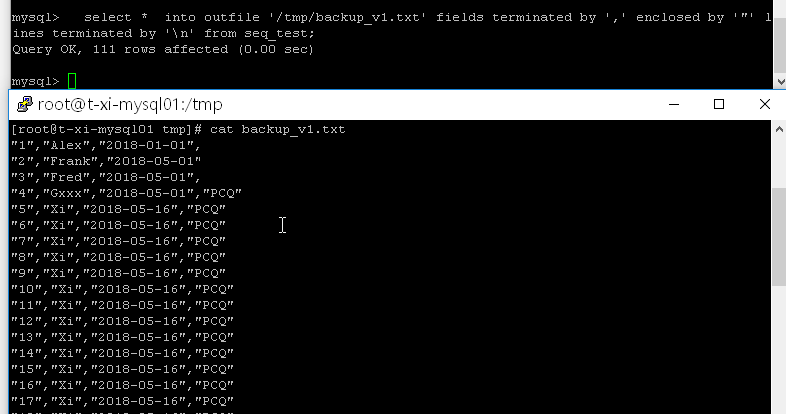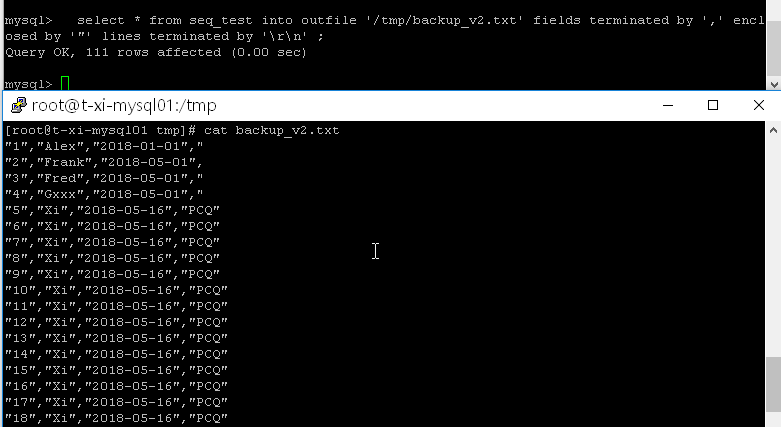MySQL->导出/导入资料[20180521]
MySQL 导出
INTO OUTFILE将资料导出至文件中
mysqldump工具导出资料和数据结构,并且可以针对数据库、数据表、索引的结构。
INTO OUTFILE测试
select * from seq_test into outfile '/tmp/backup_v0.txt';

生成一个文件,各值用逗号隔开
select * into outfile '/tmp/backup_v1.txt' fields terminated by ',' enclosed by '"' lines terminated by '\n' from seq_test;

select * from seq_test into outfile '/tmp/backup_v2.txt' fields terminated by ',' enclosed by '"' lines terminated by '\r\n' ;

mysqldump工具导出原始资料
mysqldump -u root -p runoob seq_test|gzip > backup_data.zip

也可以使用以下命令将导出的数据直接导入到远程的服务器上,但请确保两台服务器是相通的,是可以相互访问的:</p>
$ mysqldump -u root -p database_name \
| mysql -h other-host.com database_name
资料导入
针对使用INTO OUTFILE方式导出的资料,可以使用LOAD DATA LOCAL INFILE方式导入资料。
LOAD DATA LOCAL INFILE '/tmp/backup_v0.txt' INTO TABLE seq_test;
mysql> select count(*) from seq_test; +----------+ | count(*) | +----------+ | 111 | +----------+ 1 row in set (0.00 sec) mysql> truncate table seq_test; Query OK, 0 rows affected (0.00 sec) mysql> LOAD DATA LOCAL INFILE '/tmp/backup_v0.txt' INTO TABLE seq_test; Query OK, 111 rows affected (0.00 sec) Records: 111 Deleted: 0 Skipped: 0 Warnings: 0 mysql> select count(*) from seq_test; +----------+ | count(*) | +----------+ | 111 | +----------+ 1 row in set (0.00 sec)

还可以使用mysqlimport工具导入
[root@t-xi-mysql01 tmp]# cp backup_v0.txt seq_test.txt[root@t-xi-mysql01 tmp]# mysqlimport -u root -p --local runoob seq_test.txtEnter password:runoob.seq_test: Records: 111 Deleted: 0 Skipped: 111 Warnings: 0
将mysqldump导出的资料进行导入
gunzip -c backup_data.zip>backup_data.sql
mysql -u root -p
mysql> source backup_data.sql
[root@t-xi-mysql01 tmp]# mysqldump -u root -p runoob seq_test|gzip > backup_data.zip Enter password: [root@t-xi-mysql01 tmp]# gunzip -c backup_data.zip>backup_data.sql [root@t-xi-mysql01 tmp]# [root@t-xi-mysql01 tmp]# mysql -u root -p Enter password: Welcome to the MySQL monitor. Commands end with ; or \g. Your MySQL connection id is 18 Server version: 5.1.71 Source distribution Copyright (c) 2000, 2013, Oracle and/or its affiliates. All rights reserved. Oracle is a registered trademark of Oracle Corporation and/or its affiliates. Other names may be trademarks of their respective owners. Type 'help;' or '\h' for help. Type '\c' to clear the current input statement. mysql> use runoob; Reading table information for completion of table and column names You can turn off this feature to get a quicker startup with -A Database changed mysql> source backup_data.sql Query OK, 0 rows affected (0.00 sec) Query OK, 0 rows affected (0.00 sec) Query OK, 0 rows affected (0.00 sec) Query OK, 0 rows affected (0.00 sec) Query OK, 0 rows affected (0.00 sec) Query OK, 0 rows affected (0.00 sec) Query OK, 0 rows affected (0.00 sec) Query OK, 0 rows affected (0.00 sec) Query OK, 0 rows affected (0.00 sec) Query OK, 0 rows affected (0.00 sec) Query OK, 0 rows affected (0.00 sec) Query OK, 0 rows affected (0.00 sec) Query OK, 0 rows affected (0.00 sec) Query OK, 0 rows affected (0.01 sec) Query OK, 0 rows affected (0.00 sec) Query OK, 0 rows affected (0.00 sec) Query OK, 0 rows affected (0.00 sec) Query OK, 111 rows affected (0.00 sec) Records: 111 Duplicates: 0 Warnings: 0 Query OK, 0 rows affected (0.00 sec) Query OK, 0 rows affected (0.00 sec) Query OK, 0 rows affected (0.00 sec) Query OK, 0 rows affected (0.00 sec) Query OK, 0 rows affected (0.00 sec) Query OK, 0 rows affected (0.00 sec) Query OK, 0 rows affected (0.00 sec) Query OK, 0 rows affected (0.00 sec) Query OK, 0 rows affected (0.00 sec) Query OK, 0 rows affected (0.00 sec) mysql> select count(*) from seq_test; +----------+ | count(*) | +----------+ | 111 | +----------+ 1 row in set (0.00 sec)



 浙公网安备 33010602011771号
浙公网安备 33010602011771号